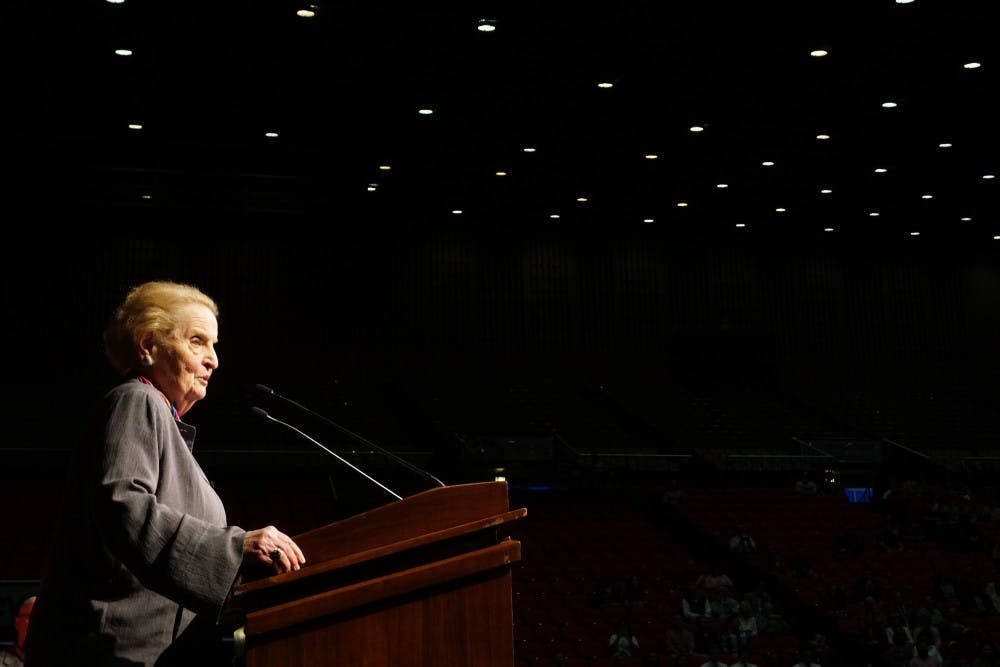First female Secretary of State talks foreign policy
By Laura Fitzgerald, Senior Staff Writer
In less than a month, the American people will elect a new president who will face many challenges in foreign policy. Madeleine Albright, the first female secretary of state, spoke of those challenges on Monday night, stressing tolerance and cooperation in a world of fear and division.
"In our era, it will often be the ones wanting to divide and destroy us claiming headlines, but it will be our job to keep our wits about us, convinced that hope is a stronger force than fear," Albright said.
Students, faculty and members of the general public packed into Millett Hall on Monday night, chattering as they waited for Albright to speak.
She outlined five challenges facing the new president: terrorism and the collapse of the Middle East, Russia's aggression and the weakening of the United States' European allies, the prevention of a nuclear arms race with North Korea, the backlash against globalization and adapting government institutions to new and faster technologies.
Albright referenced prevalent topics like the Arab spring, which, despite the lofty ideals that it started with, led to terrorist groups capitalizing on the instability of a movement without leaders. She recommended tolerance and aid as the solutions.
"We must destroy the fiction that the US is hostile to Muslims and other Arabs," Albright said. "This job will be easier if we are willing to do more to interact with the national community to alleviate the suffering of millions of refugees and to help end the civil wars from which they are fleeing."
She also brought up Brexit, the exit of the United Kingdom from the rest of the European Union, as it breeds dangerous nationalism in an era in which cooperation is needed.
Albright talked about the dangers of Vladimir Putin's nationalism and frustration at Russia's loss of superpower status following the Cold War, and the aggression in Eastern Europe that he is pushing as a result of that. Her solution is diplomacy.
"Patience and persistence, not panic, must be our approach," Albright said. "We must adopt a posture of both deterrence and dialogue, which is what NATO endorsed this summer at the summit in Warsaw."
She also referenced anger with the slow pace of government given an increasingly internet-driven world.
Enjoy what you're reading?
Signup for our newsletter
Questions for Albright were as varied as the differences between the Syrian and Baltic conflicts, the ability of democracy to succeed in countries without a democratic tradition and the question of arming Kurdish fighters in the Syrian conflict.
Albright broke the glass ceiling for women in the United States as she was sworn in by Bill Clinton in 1997. At the time, she was the highest ranking woman ever in government.
Assistant Director for External Relations for the Farmer School of Business Kirk Bogard said with such prevalent topics as Brexit and the role of China's economic growth in an increasingly globalized world the lecture tied into business classes students are taking. Albright's experience negotiating trade deals is an invaluable tool for students to learn from.
"We wanted an individual that had world or global leadership experience," Bogard said. "As a business school, we're interested in the global economy and the role the United States plays in the global economy and how that all fits together."
In addition, her status as the first female secretary of state demonstrates a positive role model for women in leadership roles, Bogard said.
"Around the world, women in leadership positions of that level and at that time you held office, they were very far and few between," Bogard said. "So we thought it was a pretty powerful statement to have her come."
Albright was chosen by a committee of faculty and students as part of the Anderson distinguished lecture series.
Senior Natalie Roberts wanted to see Albright because of her place in government. As a public administration major, she wanted to know more about Albright's work, especially as a woman in a powerful position.
"Madeleine is a public administrator so I'm just interested in seeing her perspective," Roberts said.




